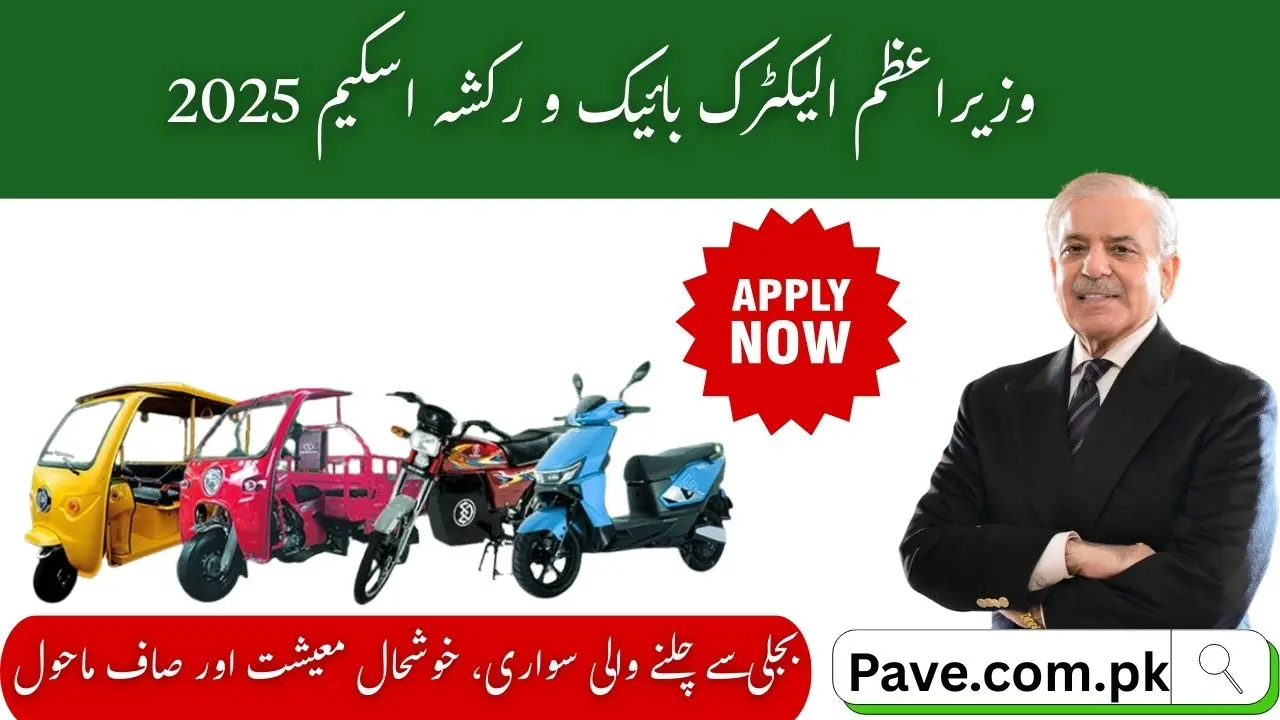PM Electric Bike and Rikshaw Scheme Impact October 2025 – Economy and Environment Benefits

The PM Electric Bike and Rikshaw Scheme Impact 2025 is more than just about providing affordable transport. This government initiative is transforming Pakistan’s economy, social structure, and environment.
By offering electric bikes and rikshaws on easy installments through Pave.gov.pk, the scheme is helping citizens save money, reduce fuel dependency, and embrace green technology.
This article explores the economic impact, environmental benefits, and long-term effects of the program across Pakistan.
Why the Scheme’s Impact Matters
Transportation costs have become a serious challenge in Pakistan due to rising fuel prices and limited public transport facilities. The scheme addresses these issues by:
- Supporting families with affordable mobility solutions.
- Helping workers and small businesses earn better incomes.
- Promoting green and sustainable transport.
- Encouraging the use of modern electric vehicles (EVs).
PM Electric Bike and Rikshaw Scheme Impact 2025 – Key Benefits
1. Boosting Economic Growth
The scheme directly contributes to Pakistan’s economy in several ways:
- Job Creation: Thousands of drivers, delivery riders, and mechanics now have employment opportunities.
- Business Expansion: Small vendors and shopkeepers can use rikshaws for affordable logistics.
- Self-Employment: Daily wage workers and youth can earn a steady income by driving rikshaws or bikes.
- Ride-Hailing Integration: Platforms like Careem, Uber, and Bykea benefit from more registered EV drivers.
By supporting small businesses and workers, the scheme reduces unemployment and contributes to GDP growth.
Check Also: PM Electric Bike and Rikshaw Scheme 2025
2. Reducing Fuel Dependency
Pakistan spends billions of dollars on importing fuel every year. With electric bikes and rikshaws:
- Lower Fuel Imports: Reduced demand for petrol and CNG.
- Foreign Exchange Savings: Less reliance on imported oil strengthens the economy.
- Stable Transport Costs: Families save money as electricity is cheaper than fuel.
This step also supports Pakistan’s energy security goals.
3. Environmental Benefits
One of the most important impacts is environmental improvement:
- Lower Carbon Emissions: EVs produce no harmful gases, helping fight climate change.
- Cleaner Air Quality: Cities like Lahore, Karachi, and Islamabad can reduce smog and pollution.
- Green Pakistan Vision: The scheme aligns with global sustainability targets and Pakistan’s climate commitments.
By shifting to EVs, Pakistan is building a cleaner and healthier future.
4. Cost Savings for Families
Transport costs are a major part of monthly expenses for low- and middle-income families. This scheme:
- Cuts commuting costs by 50–70% compared to petrol bikes.
- Reduces dependence on expensive buses and rickshaws.
- Helps families save money for education, healthcare, or small businesses.
5. Women Empowerment and Inclusivity
The scheme has a strong social impact by empowering women:
- Special Quotas: Reserved seats for women applicants.
- Safe Travel: Women can commute independently without relying on public transport.
- Workforce Participation: Teachers, nurses, and female entrepreneurs gain mobility.
- Reduced Harassment Risks: Women avoid unsafe and overcrowded transport options.
This inclusivity supports gender equality and women’s empowerment in Pakistan.
6. Promoting Modern Technology
The program is also transforming Pakistan’s transport technology:
- Introduction of EVs: Electric bikes and rikshaws are becoming mainstream.
- EV Infrastructure Growth: New charging stations being built across cities.
- Battery and Tech Awareness: Citizens learn about battery efficiency and EV technology.
- Private Sector Investment: More companies now interested in launching EVs.
This modernization strengthens Pakistan’s global image as a country moving toward smart transport solutions.
Check Also: Maryam Nawaz e-Bike Scheme 2025 – Green Punjab Vision
Long-Term Impact of the Scheme
Economic Stability
- Reduces oil import bills.
- Creates steady income opportunities.
- Expands small-scale business mobility.
Environmental Sustainability
- Contributes to climate change goals.
- Reduces urban air pollution.
- Encourages green policies for the future.
Social Development
- Increases women’s participation in the economy.
- Provides inclusive opportunities for differently-abled citizens.
- Encourages youth toward entrepreneurship.
Check Also: PM Electric Bike and Rikshaw Scheme Installment Plan 2025
PM Electric Bike and Rikshaw Scheme Impact 2025 – Latest Updates
As of September 2025, the following updates highlight the growing impact:
- Over 100,000 applicants registered successfully.
- Women’s quota expanded due to high demand.
- Subsidy amounts revised to reduce down payments.
- Charging stations operational in Lahore, Karachi, and Islamabad.
- Delivery timelines for approved applicants reduced.
FAQs – PM Electric Bike and Rikshaw Scheme Impact 2025:
Q1: How does this scheme help the economy?
By creating jobs, reducing fuel imports, and supporting small businesses.
Q2: What are the environmental benefits?
It reduces carbon emissions, smog, and pollution.
Q3: How do families benefit financially?
They save money on petrol and public transport, cutting travel costs by up to 70%.
Q4: Does the scheme support women?
Yes, with reserved quotas, reduced down payments, and safe mobility options.
Q5: How does the scheme affect technology growth?
It encourages EV adoption, battery technology, and private sector investment.
Conclusion
The PM Electric Bike and Rikshaw Scheme Impact 2025 shows how a transport program can shape the economy, environment, and society at the same time. From reducing fuel imports and supporting small businesses to empowering women and improving air quality, the scheme is a landmark step for Pakistan.
If you qualify, visit Pave.gov.pk today, apply online, and become part of a program that is building a greener, fairer, and more sustainable future for the nation.










